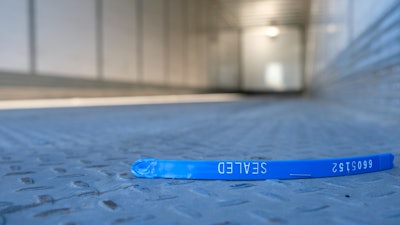

In one instance on Tuesday, Jan. 2, three armed men approached the driver of a FedEx delivery truck and stole numerous packages before fleeing.
In another robbery the same day, three men entered a parked UPS delivery truck and exited with packages. Then, less than an hour later, three suspects waited for a UPS driver to leave their truck before entering it and making off with several packages.
And, when a local TV station reported on the thefts, the reporter spoke to an over-the-road driver who had some 30 boxes stolen from the trailer he was hauling when he stopped at a gas station in Memphis. He said he normally drives through or stops in Memphis on his way from Michigan to Arkansas. The driver told KBTX he wouldn't be stopping in Memphis on future trips.
Scott Cornell is the transportation business lead and crime and theft specialist for Travelers Insurance. As such, he is acutely aware of the growing problem of cargo theft, which had a marked increase in 2023, and which Cornell said is expected to continue this year.
"We started to notice big increases in the second half of 2022," said Cornell. "That's when we first started to see a pretty quick uptick. So all cargo theft is up, but strategic theft has seen the largest increase.
 Scott Cornell
Scott Cornell
Cornell said the state of the economy has some impact on cargo theft. But, he said the economy is often given too much credit for the increases. Instead, he said the economy drives what gets stolen.
Food used to be the number one item targeted by cargo theft for one good reason, according to Cornell. It gets consumed shortly after it's stolen.
"There's no barcode on frozen chicken," said Cornell. "There's no serial number on a pistachio. You don't activate a warranty on frozen seafood over the internet. It's largely untraceable. As a cargo theft investigator, I go from having six months to chase a load of televisions to six days to chase a load of food."
That was the case until the lockdowns caused by the COVID-19 pandemic. In 2020, consumers were buying household goods, home exercise gear, and equipment for their newly created home offices. Then, Cornell said electronics came back as the number one commodity. "Why? We were told there was a shortage of chips."
He said for the first half of 2022, electronics were the most stolen items. But, by the second half of the year, food and beverages, household goods, and electronics were all equally targeted. Then, for most of 2023, food once again led the most stolen list.
Regardless of the commodity being targeted, the traditional means of stealing it account for much of what gets taken. Cornell said straight cargo theft, that's where crooks physically go out and steal it where it sits continues to be a problem. "So you're talking about going out to major port areas, California, Texas, Florida, or inland port areas, Memphis and Illinois, where they have rail yards and having to be physically there to go and steal the freight. Now that's still, as we sit here today, the number one method for cargo theft is still straight theft."
But, what is behind the dramatic increases in cargo theft, is far more nefarious than three crooks grabbing packages from delivery trucks. Cornell said the explosive growth in thefts is coming from sophisticated organized crime operations often located in other countries.
He said these organized cargo theft rings can operate from anywhere because of all the same systems that the supply chain has put in place to make itself more effective, more efficient and faster. Cargo thieves, said Cornell, have figured out how to take advantage of those and can commit theft over the internet.
"So now we're seeing an increase in part due to the ease of use, the ease of the ability to do it virtually," said Cornell, who is a former cargo investigator. "Instead of having to go target one truck that's sitting in one place, I can target 12 loads from one company and redirect and steal all 12 of those loads in one theft, just like that. So ease of use, ease of capability is certainly a big part of that."
It also means that cargo theft has gone global. Cargo theft rings operating in the U.S. may have ties to criminal enterprises in foreign countries.
"Now you go from having a demand that was domestic for the goods to (demand) being international," said Cornell. "So you have a much bigger marketplace, so to speak, to sell the things that you steal. And so with increased market share, you have increased demand, and you're going to have an increase in theft."
These theft rings can be physically located anywhere in the world, and use the internet to accomplish their thefts.
"Now if I'm conducting these thefts virtually, I don't have to be in the port area," said Cornell. "I don't have to be in Southern California. I can see a load that's posted on a load board in Wyoming, and if I like that load, I can steal the identity of a freight broker, hire a trucking company to go get it for me, and have them take it to California and have them crossdock it."
Because of this, Cornell said cargo theft is spreading to locations where it hasn't been before.
"We're seeing thefts in Iowa to target meat," he said. "We're seeing thefts in Wyoming. We're seeing thefts in Oklahoma and Nebraska because by conducting these strategic thefts, I can steal anything anywhere from wherever I am."
And, Cornell said these cargo theft organizations usually target small companies. those with 10 trucks or fewer. Often, they can talk directly to a driver and not have to go through whatever security measures a fleet may have in place.
What can individual drivers do to combat cargo theft?
"In all my time doing cargo theft, I find drivers have a big sense of responsibility," said Cornell, who has been around trucking since he was 18. "They feel like they are responsible for the trust that people put in them to move their freight. They're good people who want to do the right thing, and they don't make good victims.
"They don't want to be a victim of a crime. They don't take it lightly. So I think awareness for drivers understanding what's going on with cargo theft trends is one of the biggest things. It will just make them more alert, right?"
Cornell said drivers should be a little more aware of making sure they know who they're doing business with. He suggests taking time to verify that the people you're doing business with, the people who are asking you to tender a load are who they say they are.
As for 2024, Cornell said, "I wish the news was better, but there's nothing right now indicating that this is gonna slow down at all."
He said he was at a recent conference of cargo theft investigators, and to a person, they said the same thing: they see it continuing through 2024.
To protect themselves this year, Cornell suggests drivers and/or fleets invest in devices that make their trucks, trailers, and cargo harder to steal. He urges high-security door locks on trailers, air cuff locks, and landing gear locks.
"If there are 400 trucks in the truck stop, be one of the most difficult ones to steal," he suggests.
Cornell also urges truckers and their companies to have a plan of what to do should they have a theft.
"If you have a theft at two o'clock in the morning in a truck stop in the middle of Iowa, who are you calling and who are you calling that's going to pick up the phone?" he said. "Have all that information that's needed."
Cornell said to have a photo of your truck and the trailer as well as any paperwork including your bill of lading.
The important thing to remember, said Cornell: "Will you know exactly what to do if you have a theft?











